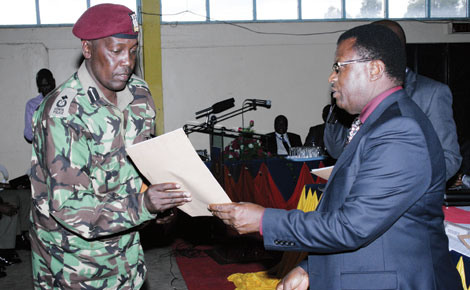×
The Standard e-Paper
Stay Informed, Even Offline
 |
| NPSC Chairman Johnston Kavuludi hands over a vetting participation certificate to Assistant Commissioner of Police Bunei Rono at the CID Training School in Nairobi’s South C during the release of the results of the police vetting, Wednesday. [PHOTO: COLLINS KWEYU/STANDARD] |
Kenya: Twelve senior police officers were Wednesday sacked after they were found unsuitable in the ongoing vetting.
Nine senior officers will be probed further.